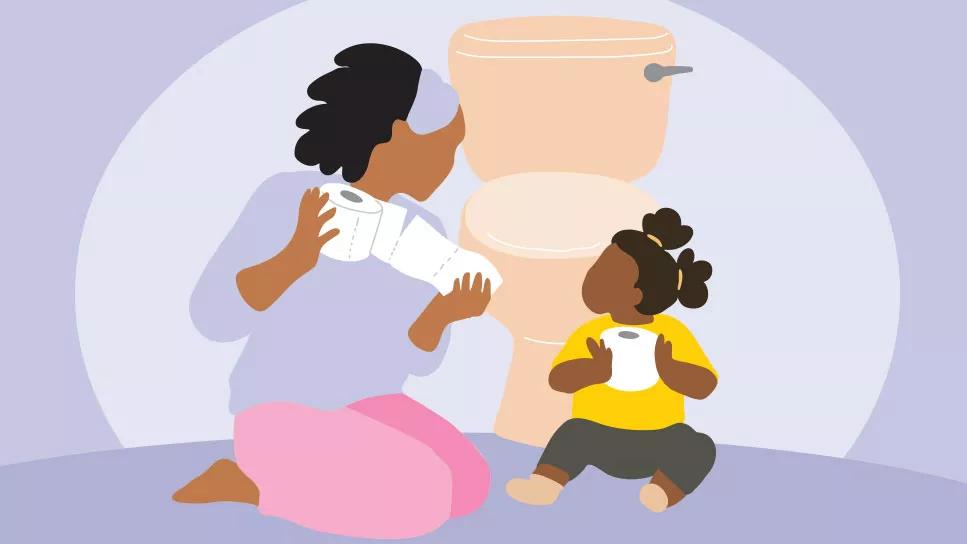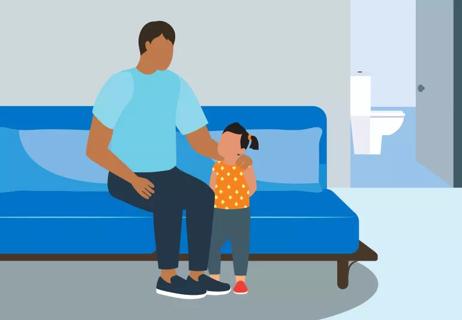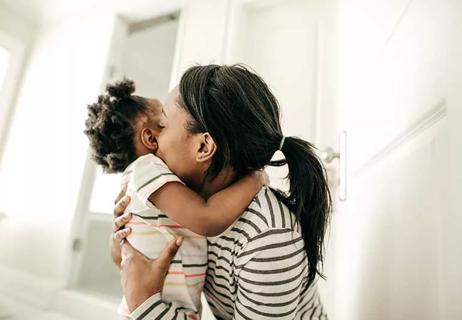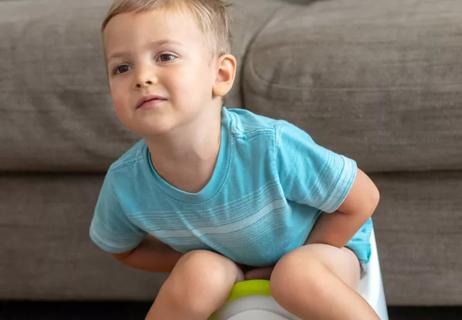Set your child up for potty training success by waiting until they’re ready, keeping the pressure low and going heavy on the praise

You’ve heard it before, and it’s true: We all get potty trained eventually.
Advertisement
Cleveland Clinic is a non-profit academic medical center. Advertising on our site helps support our mission. We do not endorse non-Cleveland Clinic products or services. Policy
But that doesn’t mean you don’t want “eventually” to be more like ... well, now. Because chasing down that quick-as-lighting toddler at changing time is getting old fast. And if you have to buy one more box of diapers thinking they’re “the last ones,” you might just cry. And let’s face it, the diaper bag really is cramping your style.
It’s natural to want to figure out how to potty train your child and slide into a lifestyle where you don’t have to do the sniff test.
We get it.
We talked with certified nurse practitioner Kimberly Slocombe, CNP, about how to potty train kids successfully. And she offers up her best tips to make the process easier on the whole family.
The pressure to potty train can be real.
But pushing to potty train too soon can make the entire experience harder, Slocombe notes. “So many parents get frustrated or run into problems when they try to train a child who just isn’t ready,” she says.
There’s no perfect age to potty train. Period. Hard stop.
But Slocombe recommends waiting until your child is between 2 1/2 and 3 1/2 years old before starting to potty train. “That’s when most children have enough brain and bladder development to potty train successfully,” she adds.
Advertisement
More than a matter of age, though, is a question of readiness. Consider these factors:
Kids who are ready to ditch the diapers need to have solid “big motor” skills. That includes things like walking and going upstairs.
You probably don’t think about it much, but it takes some hefty coordination for them to do things like step up to get on the potty, pull down their pants and underwear, engage the proper pee and poo muscles, wipe, get dressed, get back down and wash their hands.
It’s a taller task than many adults realize. Kids who are ready to potty train can do each of those tasks (at least mostly) independently.
Kids who can use their words to tell you when they need to go to the bathroom and ask for help will be set up for better potty training success.
Children who are ready to start potty training will show interest. They might do things like follow you to the bathroom or ask about “big kid” underwear.
Change can be tough for little kids. So, adding new things like potty training soon after life events like moving, a new baby, a separation or a vacation can be too much to handle at once. Wait and let things settle a bit before introducing potty training.
You can’t blame people who want to instill in their children mature behavior, like using the potty, ASAP. But there can be some real downsides to jumping in before your child is ready.
“Potty training too soon can make your child a chronic holder,” Slocombe warns. “Young children may know they shouldn’t wet their underwear. But that’s not the same as having the discipline to stop what they’re doing and head to the bathroom.”
Cue the wet pants and (another) outfit change.
But the trouble goes far beyond laundry piling up.
Holding urine too long can cause urinary tract infections. And holding back poop can cause constipation. Both of which can mean a trip to the doctor and big setbacks in potty training.
Putting the pressure on potty training too early can cause a lot of tension between caregivers and kids.
“Forcing children to do something they’re not ready for can affect their development,” Slocombe cautions. “Children can develop anxiety, especially around their parents, which can have repercussions on the parent-child relationship.”
Potty training a few months early isn’t worth that.
Potty training is a natural process, one that will happen for most children by age 5.
“Give them reasonable time to master toilet training on their own,” Slocombe encourages.
Keeping your expectations reasonable will help keep the pressure valve turned down.
Use these milestones to measure your child’s potty progress:
Advertisement
Remind yourself that even after reaching each of these milestones, accidents are bound to happen. And it’s OK.
Set up your bathroom for potty training success before you start encouraging your tot to plop a squat.
Having a kid-friendly setup can help make sure your child will feel safe, secure and comfortable with the new routine.
Consider things like:
Some people choose to buy those little stand-alone potties that are made for toddlers. They’re low to the ground and easy for them to get to. If you choose that route, be sure to clean it out after every use.
Other people prefer to have their child use the same toilet as the rest of the family. In that case, you’ll likely want to get a child-size seat to put on top of the toilet seat. That will help keep their little bum secure and help avoid any worries they may have about “falling in.”
Advertisement
Either option is fine. But if your child will use a standard toilet, you’ll probably need a step stool, too, so they can get on and off safely.
Note that Slocombe and most other potty training experts recommend starting potty training by teaching all kids to sit on the potty. That’s because kids will often need to go No. 1 and No. 2 at the same time, so sitting is easier for kids when they’re starting out. Later, when your child develops a better understanding of their bodies’ cues, they can be taught to stand and aim when they need to pee.
Sitting and waiting for the pee to come can be borrr-inggg to a kid who, frankly, thinks they have better things to do with their time. Consider leaving a few special toys or books in the bathroom to keep them entertained.
Especially in the early days of potty training, accidents are bound to happen.
Before rushing to get big kid underpants, you may consider starting with training pants made with diaper-like material. They hold in the mess, but your child can pull them on and off themselves.
Underwear can come later, when they’ve mastered the basics and make it to the potty more often than not.
Using the toilet takes a lot of steps. Help your kiddo out by breaking it down into more manageable pieces.
Advertisement
If you’re comfortable with it, you might start by letting your child join you in the bathroom to see how the pros do it.
Or suggest they sit on the potty, “Just to see what it’s like.” They can even start with their pants on. Then, move on to trying with their pants down. Then, they can try to engage those belly muscles and push out some pee.
Always encourage your child to wash their hands anytime they sit on the potty. It’s an important part of personal hygiene and a life-long healthy habit.
We all like to be rewarded when we do the right thing. It feels good. And kids can be especially encouraged by positive reinforcement that reminds them they’re on the right track.
When your kid makes any (any) positive progress on potty training, be their cheerleader. Tell them you’re proud. Give them a hug, a high five, a fist-bump. They’re making strides, and they deserve to be recognized.
As the wins roll in, up the ante with a sticker chart (“Five stickers and we’ll celebrate with a trip to the park!”) and other motivational tools. Choose prizes your child finds motivating. But try to limit the sugar as a potty training reward. They don’t need it.
When accidents happen (again, because they will), keep their spirits up. Potty training should stay positive. No shame. No punishment. Good vibes only.
While you may feel disappointed or even frustrated, it’s common for children to go back to having accidents temporarily.
Having intermittent accidents (for example, wetting themselves a few times one week but not the next) is to be expected. Keep calm and potty on.
Potty training regressions, though, are patterns of accidents that are longer lasting. Often for several weeks at a time.
Regressions are common in kids who weren’t really ready for potty training in the first place. Or they can stem from things like stress and anxiety, or even trauma and medical conditions like UTIs.
If you’re concerned that your potty-trained kid suddenly isn’t and you’re not sure why, talk with a healthcare provider, like their pediatrician.
Nocturnal enuresis is the technical term for bed-wetting. And it’s something you can expect to happen long after your child masters daytime pottying.
“Bed-wetting is typically not considered a problem until a child is 8 years old and wets the bed at least twice a month,” Slocombe clarifies.
Most of the time, bed-wetting goes away on its own as your child’s bladder grows and they learn to better sense their needs.
If you’re worried that your child isn’t taking to potty training, talk to a healthcare provider. And remember, you can always take a break from potty training if it gets too stressful for them or you.
Be patient. Be kind. Expect setbacks. And celebrate each win along the way.
Learn more about our editorial process.
Advertisement

There’s more than one way to potty train, but this intensive method can kickstart the process

Get to the source, offer encouragement and keep your cool

Praise and nonfood prizes go a long way

When your toddler won’t poop, here’s what you can do

Jaundice that’s present at birth or lasts more than a week should be evaluated by a pediatrician

Clean your baby’s mouth with a washcloth or small toothbrush if they have a tooth or you suspect thrush

A glass child is the sibling of someone with special needs — often seen as the easy one, but carrying invisible burdens

Babies can be noisy little sleepers! Blame small nasal passages and short sleep stages

If you’re feeling short of breath, sleep can be tough — propping yourself up or sleeping on your side may help

If you fear the unknown or find yourself needing reassurance often, you may identify with this attachment style

If you’re looking to boost your gut health, it’s better to get fiber from whole foods